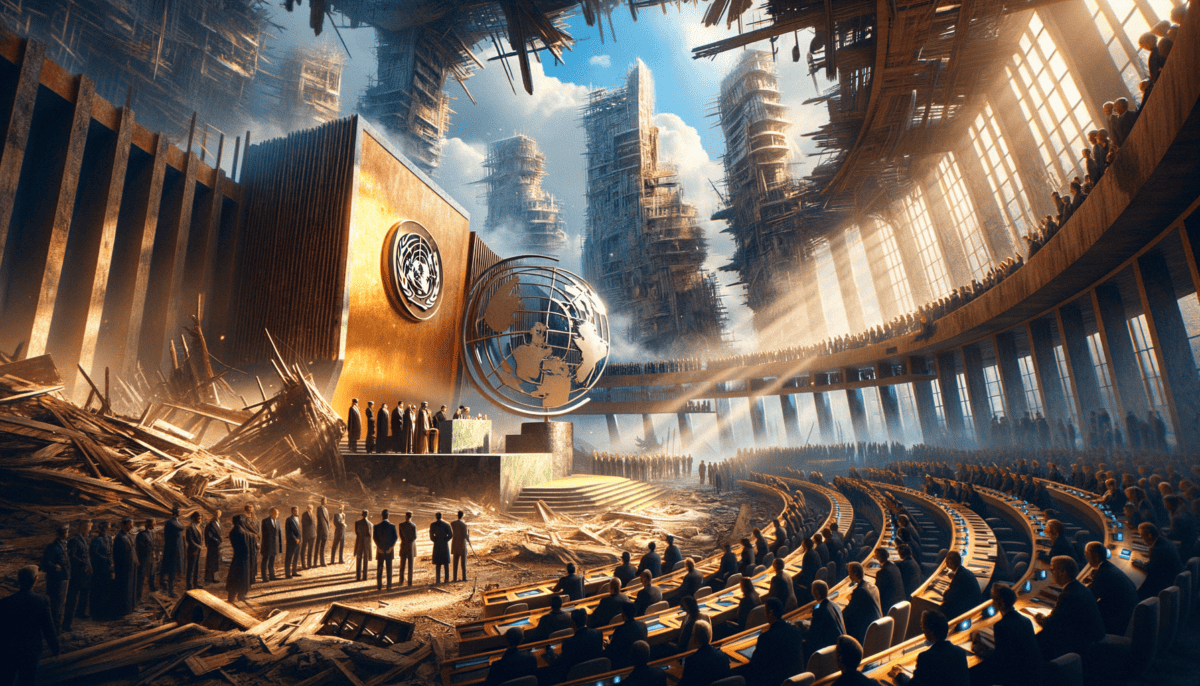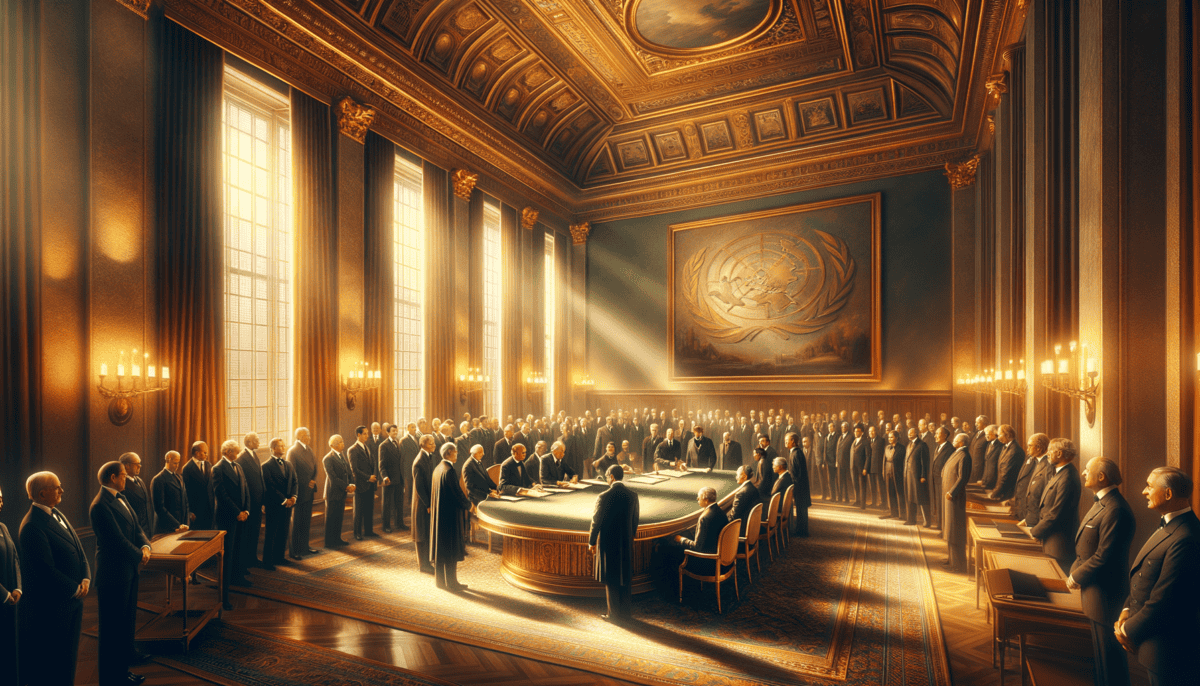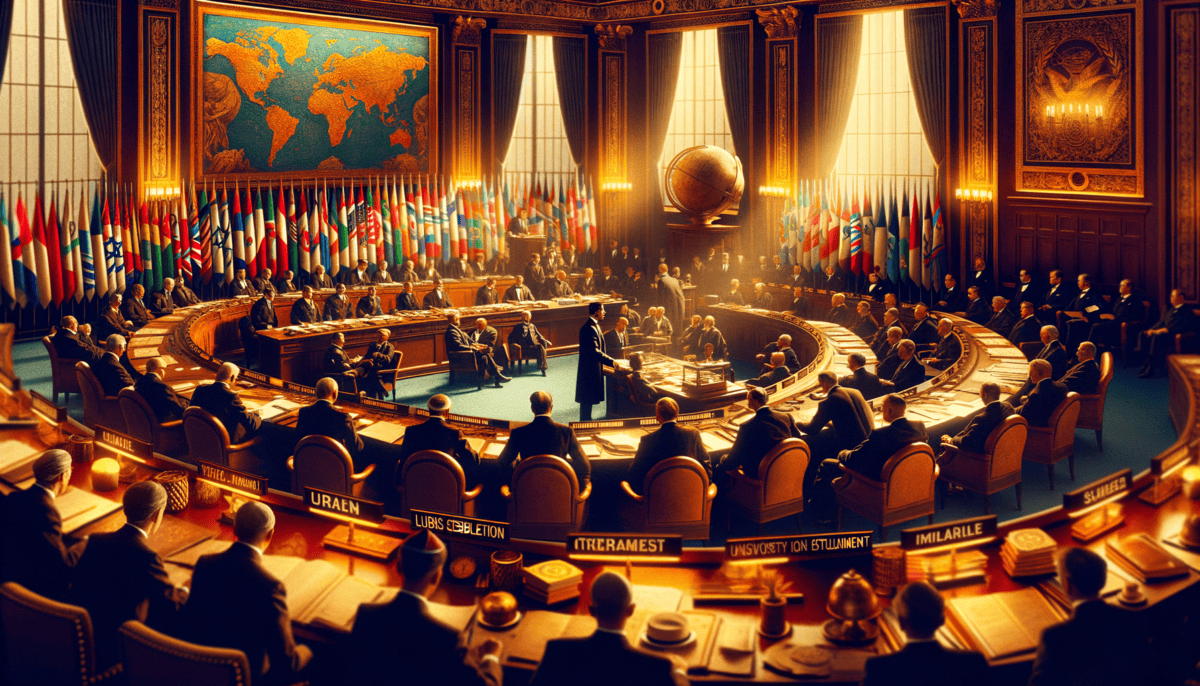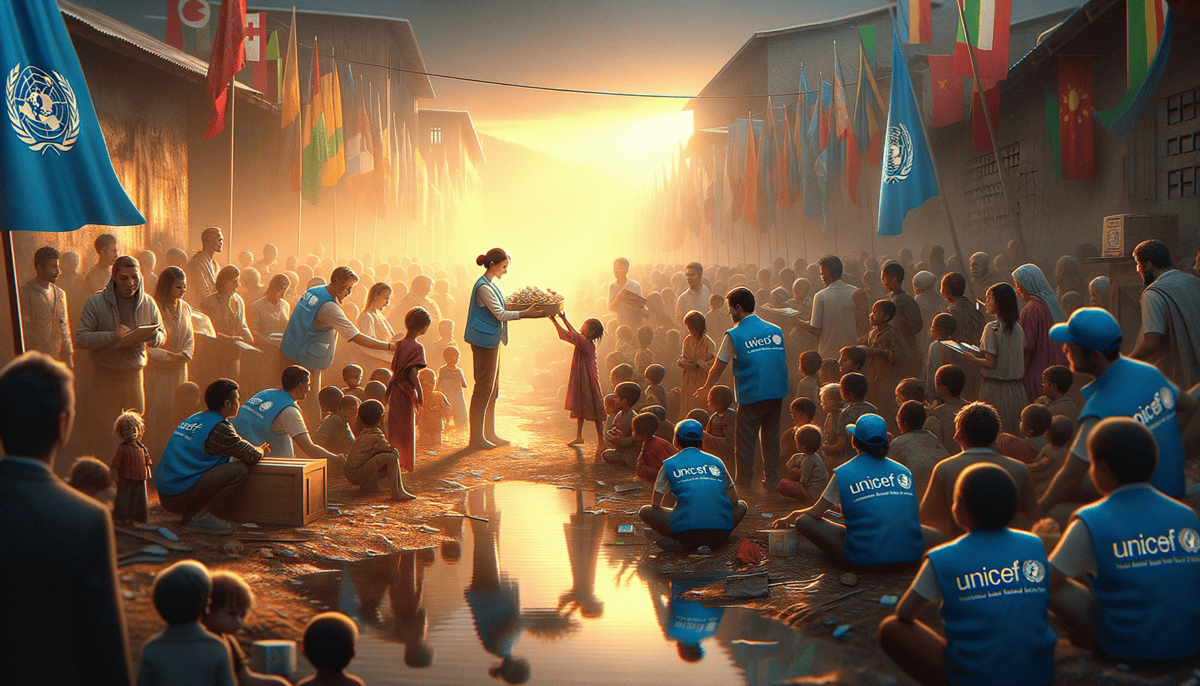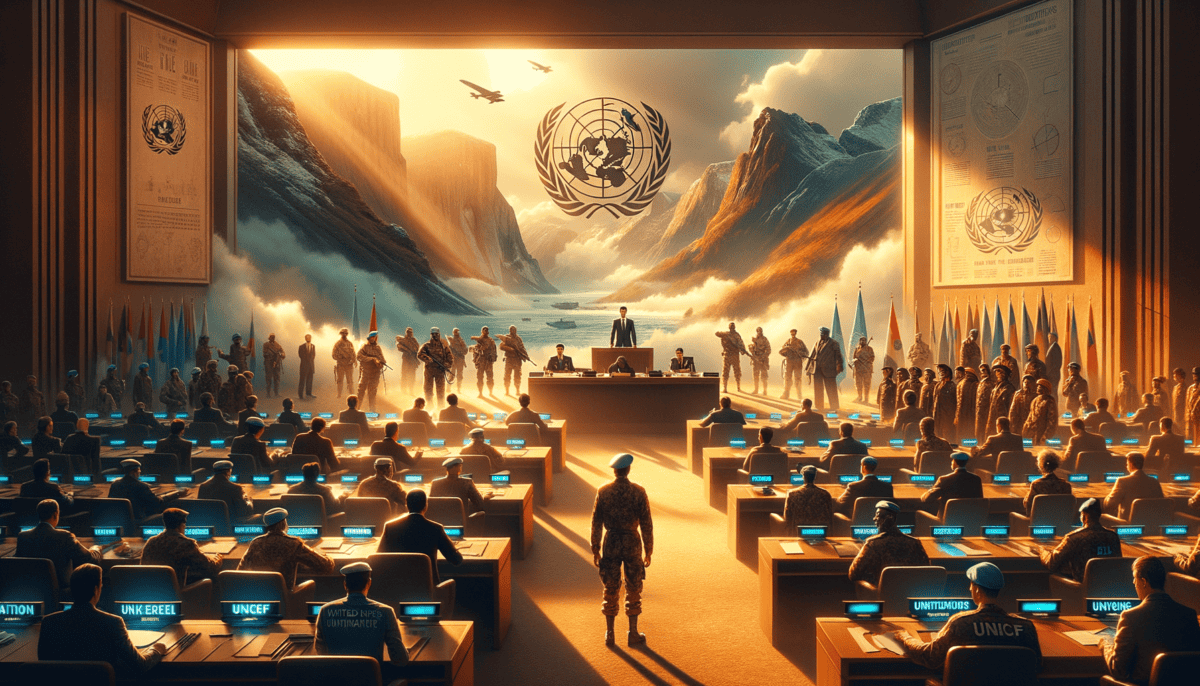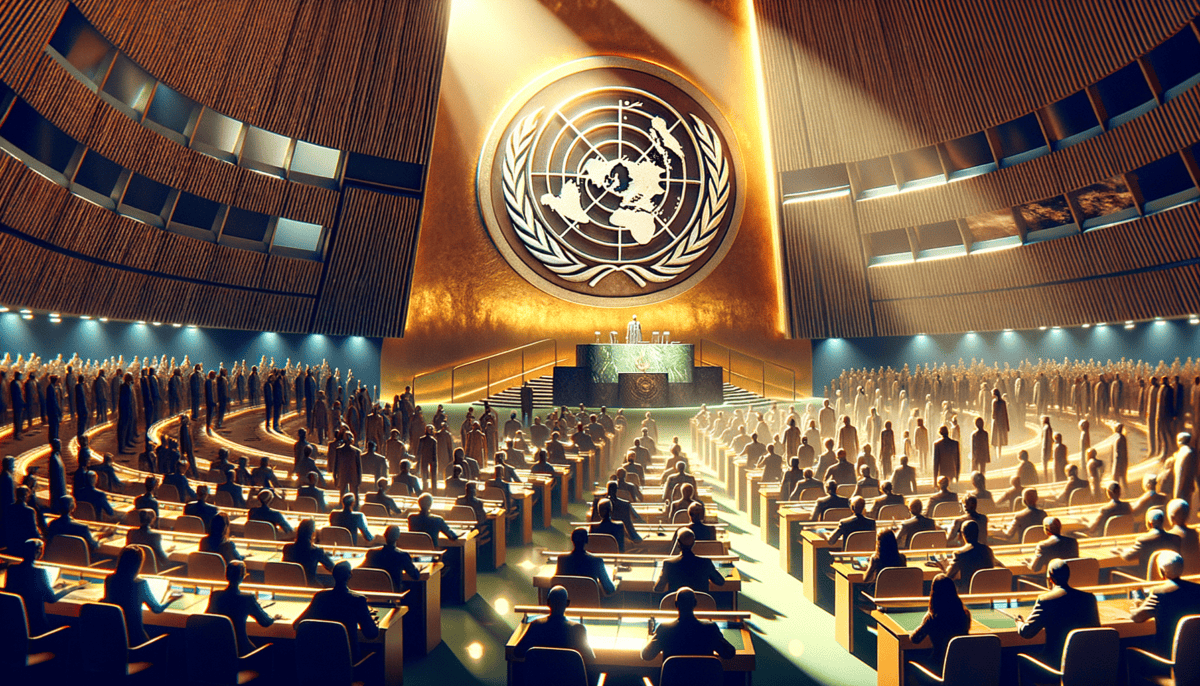Chapter 1: A World in Need of Healing
Little Sarah held her teddy bear tight as she walked through the broken streets of London. The year was 1945, and the world had just come out of a very big war.
"Grandpa, why are there so many broken buildings?" Sarah asked, looking up at her grandfather who walked beside her with a wooden cane.
"The war did this, dear one," Grandpa Thomas replied softly. He had been a diplomat – someone who talked to people from other countries to try to make peace. "But now we're going to build something new and wonderful."
All around the world, other children just like Sarah were asking the same questions. In Paris, little Pierre watched his mother try to rebuild their bakery. In Tokyo, Mari helped her family plant new trees where old ones had been destroyed.
"But how can we stop wars from happening again?" Sarah asked, her blue eyes wide with worry.
Grandpa Thomas smiled and sat down on a nearby bench, patting the space next to him. "Well, my dear, something very special is happening. Leaders from many countries are meeting right now. They want to make sure no more big wars happen."
The most important things these leaders wanted were:
- To keep peace between countries
- To help people who need food and medicine
- To make sure all children can go to school
- To protect people's rights
- To make the world a better place
"It's like making a big promise with all the countries in the world," Grandpa explained. "They're creating something called the United Nations."
Sarah hugged her teddy bear closer. "Will it work, Grandpa?"
"It will take lots of hard work and patience," he said, taking her small hand in his. "But when people work together, amazing things can happen."
That evening, as Sarah helped her mother prepare dinner, she thought about what Grandpa had told her. The radio was playing news about meetings happening in San Francisco, where important people from 51 countries were talking about peace.
"Mummy," Sarah said while setting the table, "Grandpa says we're going to make a better world."
Her mother smiled, tears in her eyes. "Yes, love. That's exactly what we're going to do."
Later that night, Sarah wrote in her diary:
Today I learned that grown-ups from all over the world are trying to make peace. Grandpa says it’s like making a big promise to be friends instead of fighting. I hope it works. Maybe one day, no little girl will have to see broken buildings again.
Love, Sarah
As she fell asleep that night, Sarah dreamed of a world where children from every country could play together, share stories, and be friends. Little did she know, the grown-ups meeting in San Francisco were dreaming of the same thing.
That's how the story of the United Nations began – with hope in the hearts of people all around the world, from little girls like Sarah to wise diplomats like her grandfather, all believing that together, they could build something better than what was broken.
A Promise for Peace
The warm San Francisco sun shone through tall windows as Sarah’s grandfather, Thomas, straightened his tie. Today was a very special day – June 26, 1945.
“Tell me again what’s happening today, Grandpa,” Sarah said, watching him prepare for the important meeting.
“Today, my dear,” Thomas smiled, “fifty-one countries are making a big promise to work together for peace. We’re calling it the United Nations Charter.”
In the grand hall of the Veterans Memorial Building, chairs were lined up neatly. People from all over the world wore their best clothes and spoke in different languages. Sarah watched from a special viewing area with her mother.
“Look, there’s Mr. Stettinius from America!” Sarah whispered excitedly, pointing to a tall man with grey hair. She had seen his picture in the newspaper.
The room buzzed with important promises the countries made to each other:
- To solve problems by talking, not fighting
- To help countries that need food and medicine
- To treat all people fairly and kindly
- To work together to make the world better
- To protect children and families everywhere
“Mummy, why are some people crying?” Sarah asked, noticing tears on many faces.
“They’re happy tears, sweetheart,” her mother explained. “For the first time, countries are joining hands instead of making fists.”
After the ceremony, Thomas found Sarah and gave her a big hug. “Would you like to see something special?” he asked, pulling a small blue pin from his pocket. It showed a world map surrounded by olive branches.
“What is it?” Sarah asked, touching the pin carefully.
“This is the new symbol of the United Nations,” Thomas explained. “The olive branches mean peace, and the world map shows that we’re all connected, like one big family.” ️
Dear Diary,
Today I saw something amazing. People from all around the world came together to promise to be friends. Grandpa says it's just the beginning. I think the world feels a little safer tonight.
Love, Sarah
Later that night, Thomas sat in his study, looking at photographs from the day. He heard small footsteps and turned to see Sarah in her nightgown.
“Grandpa,” she said sleepily, “will you tell me more about what happens next?”
Thomas picked her up and sat her on his knee. “Well, my dear, tomorrow we start the real work. The United Nations will have a special building in New York City. People from every country will meet there to talk about making the world better.”
Sarah yawned and leaned against his chest. “I want to help too.”
“You already are,” Thomas whispered, kissing her forehead. “By believing in peace, you’re helping more than you know.” ⭐
Outside the window, the stars twinkled over San Francisco Bay, witnessing the beginning of a new chapter in human history. The United Nations was born, carrying the hopes and dreams of millions of people who believed in a better tomorrow.
Peace in the Holy Land
The year was 1947, and the United Nations faced its first big test. Sarah, now twelve, sat with her grandfather Thomas in his study, looking at a map of a faraway place called Palestine. ️
“Why is everyone arguing about this land, Grandpa?” Sarah asked, tracing the coastline with her finger.
Thomas adjusted his glasses. “Two groups of people – the Jews and the Arabs – both feel this is their home. After the terrible war, many Jewish people need a safe place to live.”
“What’s that sound?” Sarah asked, hearing voices from the radio.
Thomas turned up the volume. “Listen carefully, dear. This is Mr. Ralph Bunche speaking. He’s trying to help both sides become friends.”
The radio crackled with Ralph Bunche’s calm voice: “We must find a way to share this holy land. Every person deserves a safe home.”
Sarah watched her grandfather write down the main things the UN wanted to do:
- Make two countries – Israel and Palestine
- Keep Jerusalem as a special shared city
- Help people from both sides feel safe
- Make sure everyone has enough food and water
- Send UN helpers to watch over the peace
One morning, Sarah found her grandfather looking worried over his morning newspaper. “What’s wrong?” she asked.
“Fighting has started,” he said sadly. “But look here – the UN is sending special peacekeepers. They wear blue helmets so everyone knows they’re there to help.”
Sarah imagined brave men and women in blue helmets standing between angry people, helping them calm down.
Dear Diary,
Today I learned about UN peacekeepers. They're like crossing guards at school, helping everyone stay safe and follow the rules. I hope they can help make peace.
A few months later, Thomas came home with exciting news. “Ralph Bunche did it!” he announced. “He got both sides to stop fighting and talk to each other.”
“Did they become friends?” Sarah asked hopefully.
“Not quite yet,” Thomas smiled gently. “But they agreed to try living as neighbors. Mr. Bunche won a special prize called the Nobel Peace Prize for his hard work.”
That evening, Sarah helped her grandfather pin a new map on his wall. It showed the new country of Israel, created with the UN’s help.
“The UN made a big difference,” Sarah said proudly, touching the blue UN pin her grandfather had given her two years ago.
“Yes, but our work isn’t finished,” Thomas replied. “Making peace takes time and patience. But look how far we’ve come – countries working together instead of fighting alone.” ️
As the sun set outside, Sarah thought about the UN peacekeepers in their blue helmets, still watching over the holy land. She realized that peace wasn’t just a dream anymore – it was something people could work together to build, one careful step at a time.
Helping Children and Protecting Rights
Sarah watched the snow fall outside her classroom window. The year was 1948, and winter had brought news that made her heart feel warm despite the cold. ️
“Class, I have something special to share,” Mrs. Anderson said, holding up a newspaper. “The United Nations has created something wonderful called UNICEF – to help children all around the world!”
Sarah raised her hand. “But why do children need help?”
Mrs. Anderson’s face grew serious. “Many children lost their homes in the war. Some don’t have enough food or medicine. UNICEF wants to help them all.”
That evening, Sarah found her grandfather in his study, reading an important-looking document.
“What’s that, Grandpa?” she asked.
“This is very special, Sarah. It’s called the Universal Declaration of Human Rights. The UN wrote it to protect everyone in the world.” Thomas smiled, showing her the paper.
• The right to be safe and free
• The right to have food and a home
• The right to go to school
• The right to be treated fairly
“Is it like rules for being nice to each other?” Sarah asked.
“Exactly!” Thomas beamed. “And guess what? A very brave woman named Eleanor Roosevelt helped write it.”
That night, Sarah wrote in her diary:
Today I learned that the UN is like a big friend to all the children in the world. They want to make sure everyone is happy and healthy. I want to help too!
The next day at school, Mrs. Anderson showed the class pictures of UNICEF workers helping children in different countries.
“Look!” Sarah pointed excitedly. “They’re giving children medicine and books!”
“That’s right,” Mrs. Anderson nodded. “And they’re teaching mothers how to keep their babies healthy.”
During lunch, Sarah shared her sandwich with Billy, who had forgotten his lunch at home.
“Why did you do that?” Billy asked, surprised.
Sarah smiled. “Because the UN taught me that helping others makes the whole world better.”
After school, Sarah and her grandfather walked home through the snowy streets.
“Grandpa,” Sarah said thoughtfully, “do you think the UN’s new rules and UNICEF will really help everyone?”
Thomas squeezed her hand. “It’s already helping, dear. Every day, more children are getting food, medicine, and education. More people are learning about their rights.”
That weekend, Sarah’s class organized a bake sale to help UNICEF. As she helped count the money they raised, Sarah felt proud knowing they were part of something bigger – a world where people worked together to help children everywhere.
Looking at her blue UN pin, Sarah thought about all the UNICEF workers around the world, wearing their own blue symbols, helping children just like her. She knew that even small acts of kindness could make a big difference in building a better world.
Blue Helmets: Heroes of Peace
The morning sun glinted off Maria’s bright blue helmet as she adjusted her UN peacekeeper uniform. She remembered the day she decided to join the peacekeepers, wanting to help people just like others had helped her village.
“Are you ready for your first mission?” Captain Rodriguez asked, his kind eyes crinkling at the corners.
“Yes, Captain,” Maria replied, her heart beating fast with excitement and nervousness.
Their mission was in a small village where two groups of people had been fighting. The peacekeepers were there to help them live together safely again.
“Look!” a small boy shouted as their white UN trucks rolled into the village. “The Blue Helmets are here!”
• Help people feel safe
• Make sure everyone has food
• Help children go back to school
• Help people who used to fight become friends
Maria met a girl named Amara who reminded her of herself when she was younger. “I was scared before you came,” Amara said. “But now I can walk to school again.”
Every day, Maria and her fellow peacekeepers worked hard. They helped rebuild damaged buildings, made sure food trucks could reach the village safely, and watched over community meetings where people worked out their differences.
“Peace isn’t just about stopping fights,” Captain Rodriguez told them. “It’s about helping people build a better life together.”
One day, Maria found two boys arguing over a soccer ball. Instead of taking sides, she taught them to play together. Soon, more children joined in, laughing and having fun.
“See?” she smiled. “It’s more fun when everyone plays together!”
Weeks turned into months, and Maria watched the village change. Gardens began to grow where there had been empty lots. Children from different families played together in the streets. The marketplace buzzed with activity.
“You’ve helped us so much,” an elderly village leader told Maria. “But the most important thing you taught us was how to help each other.”
That night, as Maria wrote in her journal under the stars, she thought about all the UN peacekeepers around the world – in Africa, Europe, Asia, and beyond. They were all working together to make the world more peaceful, one village at a time. ⭐
Looking at her blue helmet sitting beside her, Maria felt proud to be part of something so important. She knew that tomorrow would bring new challenges, but also new chances to help people find peace.
A World United: Today and Tomorrow
The bright morning sun streamed through the tall windows of the United Nations building in New York. Sofia, a young climate ambassador, stood in awe of the familiar sight of flags from all around the world waving in the breeze.
“Amazing how much has changed since the UN started, isn’t it?” Dr. Chen smiled, joining Sofia at the window. She was a scientist who had worked with the UN for many years.
“Tell me more about what the UN is doing now,” Sofia asked eagerly.
Dr. Chen led Sofia to a large meeting room where people from different countries were gathering. On the screen, they could see children planting trees in Africa, doctors giving medicine in Asia, and scientists studying melting ice in the Arctic.
“When we work together, we can solve any problem,” Dr. Chen explained. “That’s what makes the UN special.”
Just then, Maria, the peacekeeper from their earlier story, appeared on the screen. She was now teaching other peacekeepers how to help communities work together.
“Hi, everyone!” Maria waved. “Today we’re helping villages learn how to grow food in new ways that save water and protect the earth.”
• Fighting climate change
• Keeping people healthy
• Making sure kids can go to school
• Protecting nature
• Helping countries work together
Sofia watched as teams around the world shared their stories. In India, girls were going to school for the first time. In Brazil, people were protecting rainforests. In Canada, indigenous communities were teaching others about taking care of nature.
That afternoon, Sofia joined a video call with kids from different countries. They shared ideas about how young people could help make the world better.
“I started a recycling program at my school!” said Ahmed from Egypt.
“We’re growing vegetables in our community garden!” added Isabella from Mexico.
As the sun began to set, Sofia stood again at the window, thinking about everything she’d learned. The UN was more than just a building with flags – it was millions of people working together to make the world better.
Dr. Chen placed a gentle hand on Sofia’s shoulder. “Remember, every person can make a difference. That’s what the UN is all about.”
Outside, the flags continued to wave in the evening breeze, a reminder that when we work together, anything is possible. The story of the UN wasn’t ending – it was just beginning a new chapter, with new heroes like Sofia ready to help write it. ⭐

